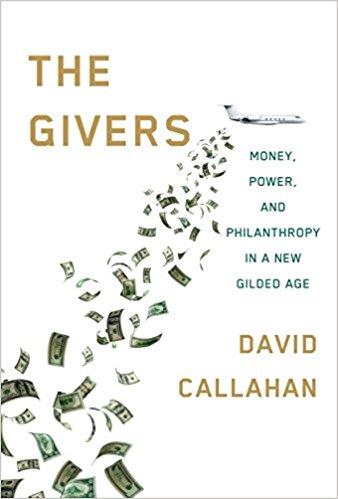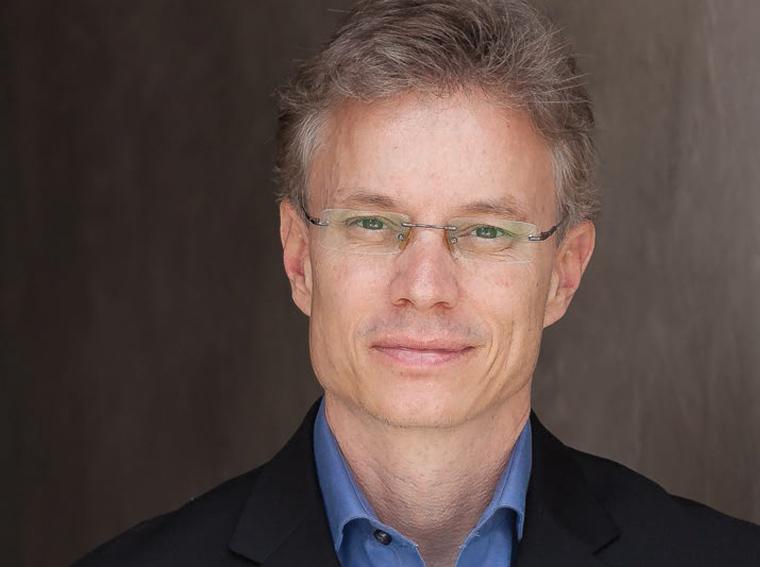David Callahan asks the tough questions to philanthropists
From Wall Street to Silicon Valley, the last few decades have witnessed a colossal explosion of wealth in the United States, creating a large and powerful upper class. Entrepreneurs with a hefty social conscience-including Warren Buffet, Bill Gates and Mark Zuckerberg- have accumulated vast amounts of money, the majority of which they decided to give away through charitable acts like signing the Giving Pledge. In order to facilitate this mass giving, thousands of foundations have been created to tackle a huge number of critical issues facing society- everything from ensuring affordable post-secondary education in the U.S., preventing climate change, to implementing global vaccination programs.
In his latest non-fiction book, The Givers: Wealth, Power, and Philanthropy in a New Gilded Age, author, David Callahan, who has spent most of his life in the nonprofit sector, asks some provocative questions about the far-reaching power of living philanthropists and their ability to influence the many facets of America.
“Philanthropy is becoming a much stronger power center and, in some areas, is set to surpass government and its ability to shape society’s agenda,” he alerts the reader in the prologue. “Still, as more mega-donors emerge, with any number of grand ambitions, we need to ask much harder questions about the accountability of philanthropy, which operates outside of familiar checks and balances,” he writes. The Givers, which is based on numerous interviews with top philanthropists, is what Callahan describes as an “intellectual smorgasbord” where he strives to know more about these “super-citizens”, how they think and operate, as well as their potential broader impact on America and public policy.
At 52, Callahan, who holds a PhD in politics from Princeton University, is no stranger to bringing attention to tough subject matter. As a lecturer, he has made many appearances on both television and radio. His op-ed and feature articles have been published in a variety of publications including the New York Times, USA Today, the Los Angeles Times, and The Washington Post. His previous book, The Cheating Culture: Why More Americans are Doing Wrong to Do Well, focuses on ethics and society. “ I’ve always been interested in the moral underpinnings of politics and values,” he explains from his home in Santa Monica. “I wrote The Givers because I wanted to look more deeply at the values of wealthy people.”
Callahan has experience examining the weath and charitable giving of others. He is the founder and editor of Inside Philanthropy, a digital media publication he created in 2014 to help nonprofits seek funding and “to bring more transparency to the world of philanthropy.” Inside Philanthropy covers pertinent current topics related to philanthropy, worldwide.
His own exposure to philanthropy began at an early age- the youngest of six children, Callahan grew up in Hastings-on-Hudson, a suburb of New York. “I was raised in the world of ideas,” he says. Callahan’s father, Daniel, co-founded the Hastings Center, a non-partisan bioethics research institution, and his mother, Sidney, is a social psychologist, who went back to school when Callahan was 10 years old to earn a PhD. Sidney was- and still is- an active protestor: Callahan vividly remembers his mother standing outside of their house in 1972, holding a sign that read “Stop the Bombing” in protest to the Vietnam War when Richard Nixon came through their town on a campaign swing.
“Belief in the power of ideas and concern about social justice were woven into the fabric of my upbringing,” he says proudly. “ None of my siblings went into the business world or worked on Wall Street. Making money was not a big value in our household.”
While Callahan’s parents were more interested in ethics, religion and philosophy, he gravitated towards politics. Focusing mainly in the world of non-profits, Callahan first worked as a resident scholar at the Century Foundation, a progressive think tank where he dealt with foundations and cultivated relationships with major donors on a daily basis. “ I came to appreciate how important wealth is, and how opaque it is as well, “ he explains. “There is a tremendous amount of money in the hands of foundations and wealthy donors, but there is not a lot of transparency.”
During his post at the Century Foundation, Callahan discovered conservative think tanks were (and still are) very influential in moving U.S. politics to the right.
“I also became very interested in the larger question of philanthropic power over public policy, and ultimately philanthropists’ role in democracy,” he remarks. Callahan continued to work in public policy and moved on to co-found Demos in the 2000’s, a nonprofit public policy organization aimed at reducing economic and political inequality.
 It seems only natural that Callahan would write a book like The Givers– a combination of both his fascination with the world of the elite philanthropists in the United States, and his overall concern that such huge financial contributions to society could come at a significant cost. He compares this new Gilded Age of unimaginable wealth to the first one that happened the late 19th Century, a period in American history marked by rapid growth and industrialization. The famous Rockefeller family-who made their fortunes in oil- and an even wealthier Andrew Carnegie, leader of the American steel industry, established large foundations “ to wield huge influence in America and the world,” Callahan writes. “This time, though, everything is bigger-both the wealth and the clout that comes with it.”
It seems only natural that Callahan would write a book like The Givers– a combination of both his fascination with the world of the elite philanthropists in the United States, and his overall concern that such huge financial contributions to society could come at a significant cost. He compares this new Gilded Age of unimaginable wealth to the first one that happened the late 19th Century, a period in American history marked by rapid growth and industrialization. The famous Rockefeller family-who made their fortunes in oil- and an even wealthier Andrew Carnegie, leader of the American steel industry, established large foundations “ to wield huge influence in America and the world,” Callahan writes. “This time, though, everything is bigger-both the wealth and the clout that comes with it.”
Callahan reveals the raison d’etre behind some of the biggest givers of our time and pays homage to many of them. He describes Bill Gates and his wife Melinda as “massively influential figures” who created their own foundation in 1999, leaving a big footprint in public education and global development issues. He also asks the question as to why there is a great power shift in the U.S., and offers an explanation:
“One part is about the rising tide of philanthropic giving; the second is about the declining ability of government to solve big problems and provide public goods.”
Despite his worries about the potentially destructive power play emanating from philanthropic endeavors, Callahan admires and recognizes the impactful work and passion demonstrated by this amazing group of givers. He was thoroughly impressed when he met pediatrician Priscilla Chan, wife of Facebook founder Mark Zuckerberg. The couple has pledged 99 percent of their Facebook shares to charitable organizations with an emphasis on health initiatives and alleviating poverty.
Some of the creative giving power that Callahan commends seems to be led by other influential couples like John and Laura Arnold who fund a criminal justice initiative. He describes Dustin Moscovitz, co-founder of Facebook and software company Asana, and wife Cari Tuna, as being “deliberative” in their philanthropic activities- their foundation Good Ventures’ mission is “to help humanity thrive”. Jeff Skoll (film producer and first president of EBay) Gordon Moore (co-founder of Intel Corp.) Sean Parker (co-founder of Napster, founding Facebook president) are other top philanthropists to look out for.
Callahan is careful to present a balanced viewpoint about philanthropy in his book and claims he does not engage in what he calls “a la carte alarmism”.
“I make the point in the book that all of this mega-giving influence on our society and public policy is kind of concerning, both from the left and the right.“ Inside Philanthropy, also incorporates honest discussions about philanthropy in America today, and the complex issues surrounding.
Although he doesn’t claim to have all the answers to the questions he poses, Callahan would like to see much of this new philanthropic money generated to go towards programs on the ground that help people directly rather than to innovation and public policy. He is extremely concerned about the country’s power shift drifting away from everyday citizens toward those with wealth, and wants people from all sides of the economic and political spectrum to beware.
“The Givers is a warning about the future of our democracy- acknowledging that we do live in a populist age with a lot of distrusted elites and that distrust has rolled over in various ways, “ he remarks. If you think philanthropy will be exempt and that it will never be targeted then you haven’t paid attention to recent history.”
> This article by Rena Godfrey appeared in the New Year 2018 issue of Lifestyles Magazine.
